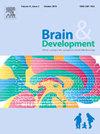对接受酶替代疗法的晚期庞贝病患者的长期观察:单一中心的 15 年观察
IF 1.4
4区 医学
Q4 CLINICAL NEUROLOGY
引用次数: 0
摘要
背景:关于晚期庞贝病患者长期接受酶替代疗法(ERT)的文献很少:本研究旨在评估ERT对晚期庞贝病患者的疗效和局限性:我们回顾性分析了接受重组人阿糖苷酶α治疗的晚期LOPD患者(2例幼年发病患者和5例成年发病患者)的临床病程,以研究ERT治疗在患者死亡或改用阿瓦糖苷酶α治疗之前所取得的改善和局限性:所有患者均不能行走,且依赖呼吸机。随访时间从 3.7 年到 15.0 年不等(中位数为 9.0 年)。所有患者都表示,在接受 ERT 的头两三年里,他们的生活有所改善。呼吸功能相对正常的患者的生命容量明显改善,但在出现气胸等呼吸系统并发症后,生命容量有所下降。在治疗期间,患者的捏力和握力趋于保持。肌肉 CT 显示,萎缩和脂肪替代主要发生在四肢近端肌肉,但 ERT 后情况并未改善。四名患者死于曲霉菌病、呼吸衰竭、回肠梗阻和不明原因的猝死:我们的研究结果表明,即使在庞贝氏症晚期,接受 ERT 治疗的患者病情也会得到一定改善。即使在 ERT 期间,呼吸系统并发症也是致命的,因此早期诊断和诱导治疗至关重要。肌肉萎缩在四肢近端进展得更为严重,即使在 ERT 后也是如此。本文章由计算机程序翻译,如有差异,请以英文原文为准。
Long-term observation of patients with advanced late-onset Pompe disease undergoing enzyme replacement therapy: A 15-year observation in a single center
Background
There have been few descriptions in the literature on long-term enzyme replacement therapy (ERT) in patients with advanced late-onset Pompe disease (LOPD).
Objectives
This study aimed to assess the efficacy and limitations of ERT in advanced LOPD patients.
Methods
We retrospectively reviewed the clinical courses of patients with advanced LOPD (two juvenile-onset and five adult-onset patients) who were treated with recombinant human alglucosidase alfa to examine improvements achieved with and limitations of ERT until their death or when switching to avalglucosidase alfa occurred.
Results
All patients were non-ambulant and ventilator dependent. The duration of follow-up ranged from 3.7 to 15.0 years (median 9.0 years). All patients reported improvements in their lives during the first two or three years of ERT. Vital capacity was clearly improved in patients with relatively spared respiratory function, although it deteriorated after respiratory complications such as pneumothorax. Pinch and grip power tended to be preserved during the treatment period. Muscle CT revealed progression of atrophy and fatty replacement predominantly in the proximal limb muscles without improvement after ERT. Four patients died due to aspergillosis, respiratory failure, ileus, and sudden death of unknown cause.
Conclusions
Our findings demonstrate that patients undergoing ERT show certain improvements, even in the advanced stage of Pompe disease. Respiratory complications are lethal even during ERT, and early diagnosis and induction of therapy are critical. Muscle wasting progressed more severely in the proximal limbs, even after ERT.
求助全文
通过发布文献求助,成功后即可免费获取论文全文。
去求助
来源期刊

Brain & Development
医学-临床神经学
CiteScore
3.60
自引率
0.00%
发文量
153
审稿时长
50 days
期刊介绍:
Brain and Development (ISSN 0387-7604) is the Official Journal of the Japanese Society of Child Neurology, and is aimed to promote clinical child neurology and developmental neuroscience.
The journal is devoted to publishing Review Articles, Full Length Original Papers, Case Reports and Letters to the Editor in the field of Child Neurology and related sciences. Proceedings of meetings, and professional announcements will be published at the Editor''s discretion. Letters concerning articles published in Brain and Development and other relevant issues are also welcome.
 求助内容:
求助内容: 应助结果提醒方式:
应助结果提醒方式:


